Keeping life organized often feels like a juggling act. Just as swiftly as you move to catch one ball – say finances, family commitments, or fun with friends – the next one is hurtling towards you. Unfortunately, some balls are bound to hit the ground: weeks failing to prioritize sleep, fast food instead of meal prep, and procrastinating with low-impact tasks instead of focusing on deep work.
Instead of throwing life’s tasks in the air in hopes you’ll somehow manage to catch them all, follow a framework to keep every area of your life in order.
This guide will cover 10 rules to truly organize your life – and keep it organized. Then, we’ll jump into how you can apply them across all the areas that are important to you: work, school, business, home, health and fitness, finances, and your relationships.
The result is getting more done while feeling less stressed. Less juggling, more living.
We’ve made a companion video below, if you prefer a video format. Continue reading for a closer look at the framework.
The Organize Your Life Framework
Rules can feel rigid and joyless: do this, not that. But in reality, following a set of guidelines in life can be freeing. When we have a predetermined set of ways we aim to act, we limit the analysis paralysis that comes with choice and the agony that flows from indecision. That’s not to say that life shouldn’t include some serendipity – we include “Experiment” as part of this framework so you can find the happy accidents in life without feeling like everything is spinning out of control.
By following simple rules and applying them consistently, you’ll organize your life in a way that adds calm to your days and order to your weeks.
1. Develop habits and build a routine
We all have habits that have solidified in our lives over the years and routines that determine our actions without conscious thought. The question is whether these habits are intentional or simply the result of inertia.
| Good Habits 👍 | Bad Habits 👎 |
| Sleeping 8 hours/night | Sleeping 5 hours/night |
| Reading for 1 hour every evening | Spending all free time watching TV |
| Meal prepping every Sunday | Regularly getting takeout |
| Making time for friends and family | Isolating yourself |
| Setting boundaries between work and life | Overworking to the point of burnout |
Good habits set us up for long-term success and make us feel good. Bad habits rob us of our time, health, happiness, and money. Take a look at the habits in your life too see what’s working, what needs to go, and what new habits would help you reach your goals.
- Do you spend hours scrolling through Instagram each day?
- Do your monthly bank statements have more takeout line items than you care to admit?
- Could you be using your free time to get in more physical activity?
Building good habits isn’t easy. In James Clear’s Atomic Habits he advises us to have a strong reason behind why we want to develop a certain habit:
“Ultimately, your habits matter because they help you become the type of person you wish to be. They are the channel through which you develop your deepest beliefs about yourself. Quite literally, you become your habits.”
Once you have the habits you want in your life, assemble them in a daily routine that keeps you productive. When you have good habits and can string them together into a strong routine, you can rely less on fleeting motivation and leave minimal room for procrastination and distraction.
2. Plan ahead
Life has unpredictable twists and turns. That doesn’t mean a little planning doesn’t go a long way. A task manager, like Todoist, and a calendar are the tools you need to think and plan in advance and organize your life.
Set aside time to map out your days and plan your weeks. When you know which day your work presentation is due, you can work backwards and add to-dos to your task manager to get it done. If you capture when your kid’s parent-teacher conferences are in your calendar, you can rest easier knowing that things aren’t slipping through the cracks.
Here are a few tips for planning:
- Plan and schedule in the small things – they add up! (e.g. laundry, cleaning, etc)
- Dedicate an hour a week to planning your week (e.g. friday afternoon, monday morning)
- Overestimate how long a task will take you
- Try time blocking your day
In Laura Vanderkam’s 168 Hours: You Have More Time Than You Think, she stresses the importance of planning your week:
“…well-planned blocks of 168 hours are big enough to accommodate full-time work, intense involvement with your family, rejuvenating leisure time, adequate sleep, and everything else that actually matters.”
Of course, the emphasis is on “well-planned”. By scheduling everything on your calendar and adding all your tasks to your to-list, you can work within the confines of your week to give focus to everything that’s important to you.
3. Embrace your natural inclinations
Organizing your life and thoughtfully crafting your habits and routines can quickly become a self-defeating exercise in aspirational living.
- “I should wake up at 5am everyday.”
- “I should really switch to veganism.”
- “I’m not going to watch any more movies.”
The only problems? You’re a night owl who does your best work at 12AM, you love a good steak, and a good film is how you unwind. To organize your life, opt for habits that fit with your natural inclinations. Be realistic about yourself and embrace what you can conceivably commit to for the long haul.
Here are a few different areas where you can lean into your natural state:
- If you dislike ironing, buy only clothing in wrinkle resistant materials
- If you hate going to the gym, join a recreational sports team
- If you don’t enjoy reading, listen to podcasts and watch documentaries
By opting for the path of least resistance you can save yourself the time of trying to embrace what you hate and simply opt for what you enjoy.
4. Consistency over perfection
For many of us, an “all-or-nothing” attitude can be a source of self-sabotage. When we fail to meet the unrealistic expectations we set for ourselves, we throw in the towel altogether. By understanding the impact of incremental progress and the power of compounding effort, we can be more realistic and get more out of life.
The first step is creating realistic plans that fit into our lives:
| Realistic Plans 💁♀️ | Unrealistic Plans 🙅♀️ |
| Exercise 3 days/week | Exercise daily |
| Watch 5 hours of TV/week | Never watch TV |
| Eat out a maximum of once/week | Never eat out |
| Save 30% of my take home salary | Save 80% of my take home salary |
| Take the kids to the park 3x/week | Take the kids to the park everyday |
Unrealistic plans set us up for a spiral of shame and regret when we ultimately fall short of our goal. Make consistency a part of your life and get used to imperfection. By opting for continuous effort towards a realistic aim we create more room for everything we want to do in life.
5. Find balance
In our attempt to do it all and organize our lives perfectly, balance is often a casualty. Instead of getting to bed, you stay up coding deep into the night. Rather than meeting with friends, you study all weekend for an upcoming midterm.
While this strategy can work in the short-term, the long-term impacts eventually rear their ugly heads: stress, burnout, and lethargy. Instead, prioritize long-term sustainability with balance and self-care.
Here are a few strategies to consider:
- Avoid overextending yourself and spending too much time on work
- Prioritize physical activity for its mood-boosting effects
- Try meditation, journalling, or cultivating a gratitude practice
- Spend time with friends and family
- Unwind alone with a good movie or book
- Ensure you’re getting enough sleep and avoid all-nighters at all costs
Besides the day-to-day pauses to breathe, make time for longer breaks too. At minimum, try to take week-long breaks from work at least 1-2 times per year. By constantly recharging your batteries, you’ll be able to show up in work and life for yourself and others who depend on you.
6. Prioritize appropriately
One way to make juggling all of life's demands easier is to intentionally let some balls drop. To make time for what’s important to you, get comfortable with saying, “no”.
Prioritization is a key tool in the arsenal to organize your life. Doing it all is impossible; prioritizing what’s crucial is within reach. By declining what doesn’t serve your highest goals, you can give your laser focus to what matters.
Here’s an idea of what to prioritize and what to deprioritize:
| Prioritize 📈 | Deprioritize 📉 |
| What serves your goals | What takes time away from your goals |
| Anything in your "zone of genius" | Anything you can delegate |
| Things that make you happy | Things that make you unhappy or indifferent |
| Activities with high-impact | Activities with low-impact |
| Opportunities for learning and growth | Opportunities you've previously encountered |
Know your most important task each day and prioritize it accordingly. By having a strong sense of what’s important and what isn’t, you can make more efficient decisions about where to give your time and energy.
7. Declutter and simplify
It’s hard to feel organized when your mind is in shambles and your office space and house are too. Always be on the lookout for opportunities to make space –physically, digitally, and mentally.
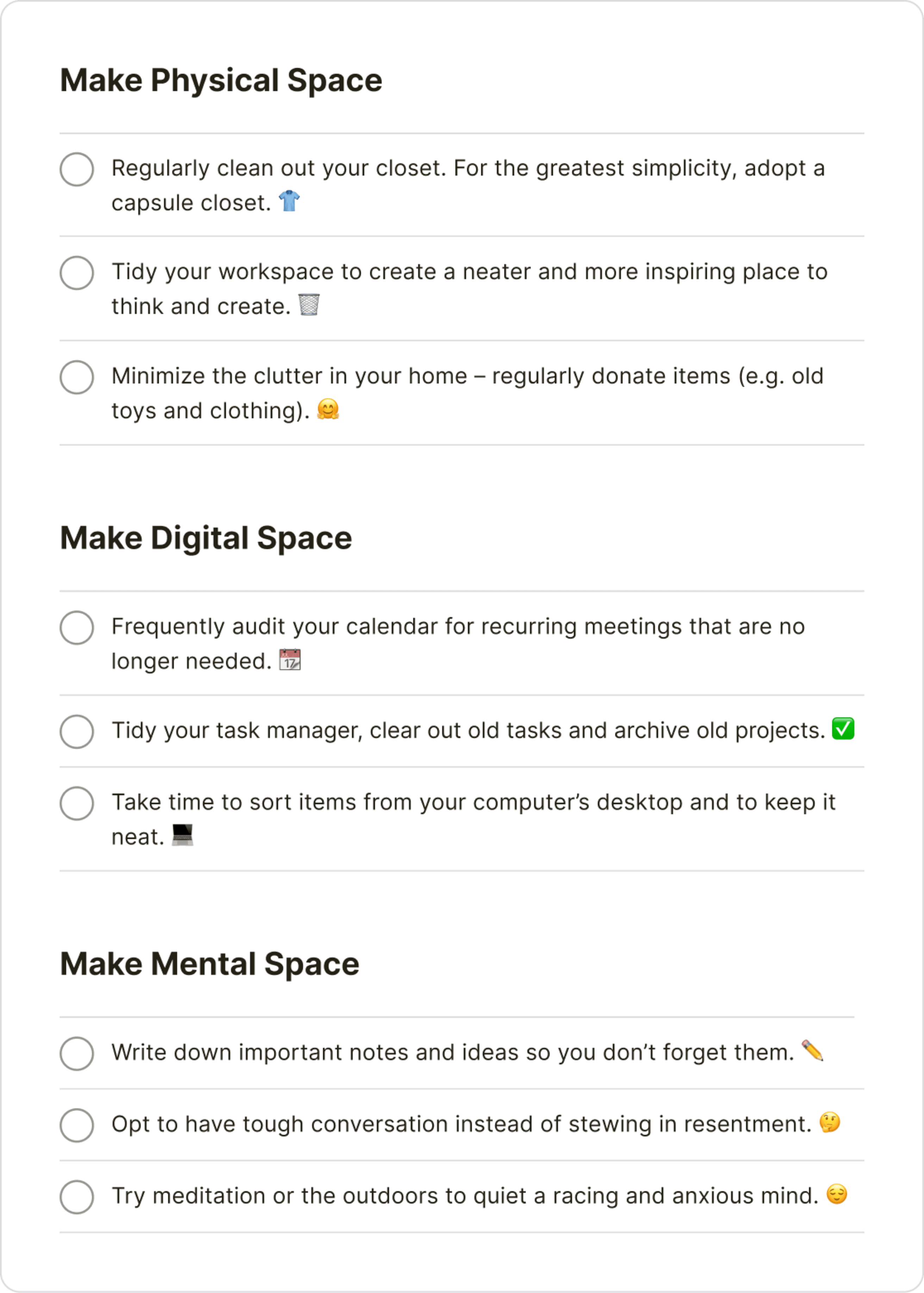
Some of the chaos we feel in our lives is the result of too much stuff, too much to do, too much to think about. Consider this when aiming to organize your life: less is more.
8. Measure your progress
Whether your goals are big or small, it’s important to measure your progress. There’s a lot of power in knowing what’s working and what’s not. You can allocate more time in your life for activities that are helping you reach your goals. You can cut out the things that are failing to make an impact for you.
These practices will help you measure your progress:
- Have a regular weekly review where you reflect on the passing week and prune your to-do list down to only the essentials
- Try out the quantified self method and measure your goals from steps to sleep
- Implement an Objectives and Key Results (OKRs) format for your goals – at work or in life
- Track your time being productive or distracted online with RescueTime
9. Automate or outsource
Habits automate your decision-making. Technology can automate your repetitive tasks. Organize your life by setting up automations that remove active effort and free up your time and energy.
Think about the areas in your life where you spend time doing manual work that an app or website could do instead. Alternately, consider where outsourcing to someone else could save you time.

There are likely a few tasks in work and life that could use a hands-off approach:
- Personal finance (e.g. paying bills, investments, etc.)
- Work (e.g. sending emails, coordinating projects, booking, etc.)
- Home (e.g. grocery shopping, meal prep, furniture assembly, etc.)
We’ll discuss in later sections what automation and outsourcing methods you can use in each of these areas.
10. Experiment
The last item in the Organize Your Life Framework is one of the most exciting: trying new things and seeking out novel experiences! Just because you’re organized doesn’t mean you can’t make room for messy spontaneity.
Sometimes things aren’t working out. Other times they’ve gone stale. These are the best times to introduce novelty to our lives and shake ourselves from a routine that just isn’t working anymore.
There’s any number of ways to escape ruts and grow in the process:
- Seek out a different job
- Try a different fitness routine
- Find new hobbies
- Make new friends
- Attempt a new productivity method
A constant eye on experimentation will bring excitement to life and break you out of periods of plateau.
Applying the Framework
Now that you know the ten aspects of the Organize Your Life framework, you can apply it to any number of areas in your life. By having some specific guidelines, you can approach each area with more confidence and less stress.
Work
It’s likely you spend the majority of your waking-hours at work. Work represents what most people are actually organizing their lives around. There’s endless conversations on how to organize the time we’re not working – early mornings, during lunch breaks, and after hours into the evening. Less attention is paid to how people should organize their workdays and make the most out of 8 hours you’re likely spending at a desk.
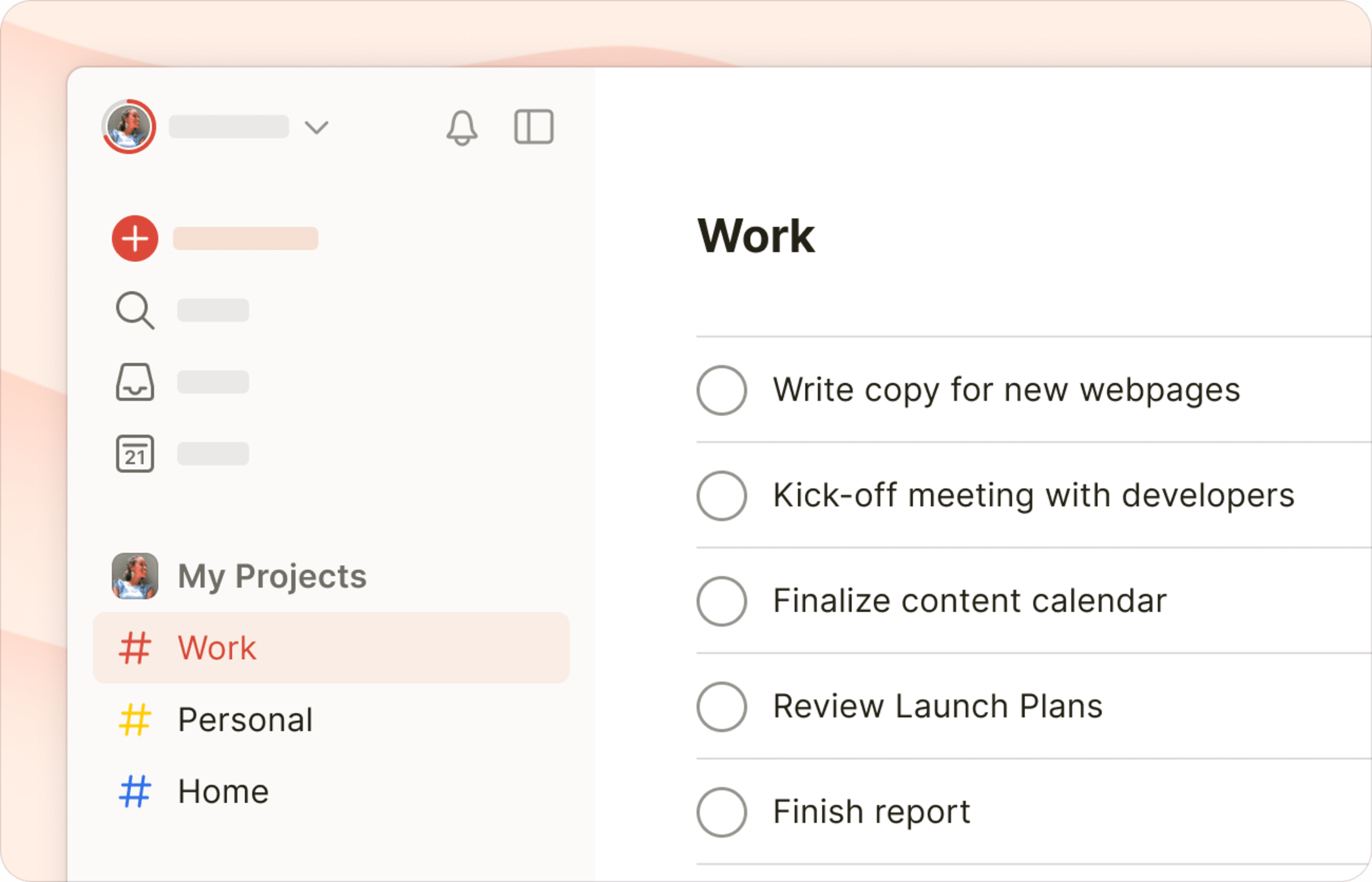
Staying productive at work follows the same rules whether you work from an office, work from home, or run your own business.
Organize Your Life at Work
[Apply the lessons of Declutter, Prioritize, Automate or Outsource and Balance.]
Declutter your desk, inbox, and task manager. It’s challenging to focus or get anything done if you don’t feel like you have everything in order. A desk overflowing with loose sheets of paper and coffee cups is hardly conducive to concentration. An inbox and task manager that isn’t organized leaves us unclear on what we should work on next. Regularly schedule in time to go from clutter to clear.
- Clean up your desk and close all your tabs and apps at the end of each workday. This way you start afresh each day.
- Do your best to reach inbox zero at the end of each day, even if it means archiving unreads.
- Take 10 minutes at the end of each day to arrange your task list for the next day as part of your end of workday routine.
Prioritize deep work. Most people fall into the urgency trap at work, putting out small fires instead of focusing on the big-picture, high-impact work. But it’s high-impact projects that get you promoted or take your business to the next level. Organize your day by starting with a deep work session that centers the most high leverage thing you should be doing at work to garner more customers, land a big sale, etc. After that, you’re free to do whatever else needs to be done: emails, meetings, etc.
Find opportunities for automation and outsourcing. We do our best work when we’re in what Gay Hendricks’s calls our “zone of genius”, the area of focus that utilizes your best skills and innate abilities. Ideally, everything else should be automated or outsourced.
- Use email template snippets to add automation to regularly sent emails
- If you’re a business owner and can afford help, hire a virtual administrative assistant to manage your appointments and travel
- As a manager, delegate tasks and projects to team members who may have more specialized skills.
Balance work goals with life. Burnout is when ambition overtakes balance. While you may love your job and are focused on mastery, ensure you make time for rest and recovery. The best physical competitors regularly sleep more than 9 hours each night. Train like an athlete: go hard, but prioritize off-time.
- Put in your best effort during the day but ensure you leave work on time
- Unplug during the weekends and spend time with family and friends
- Avoid after-hours emails and team chat messages
- Book regular time off each year for vacations to recharge
Home
Home is where it all happens. From doing the dishes to dinner parties, keeping up a clean and tidy household is a never ending unpaid job. However, by being diligent and using some outsourcing hacks, running a household can be a little easier.
Organize Your Life at Home
[Apply the lessons of Habits, Declutter and Simplify, and Automate or Outsource]
Build habits for running a household effectively. Lamenting about a few chores as a kid seems funny now that all the chores are your responsibility. Building regular habits can help make sure they never get completely out of hand. By doing a little bit on a daily, weekly, and monthly basis you can keep everything running relatively smoothly.
- Have daily household habits like making your bed, folding laundry immediately, and clearing the dishes before bed.
- Have weekly household habits like sorting mail, vacuuming, and tidying your closet.
- Have monthly household habits like deep cleaning, changing air filters and steam cleaning the carpets.
All of this can get overwhelming and difficult to remember. Use a task manager, like Todoist, to set up daily, weekly, and monthly recurring tasks so you can free up your memory.
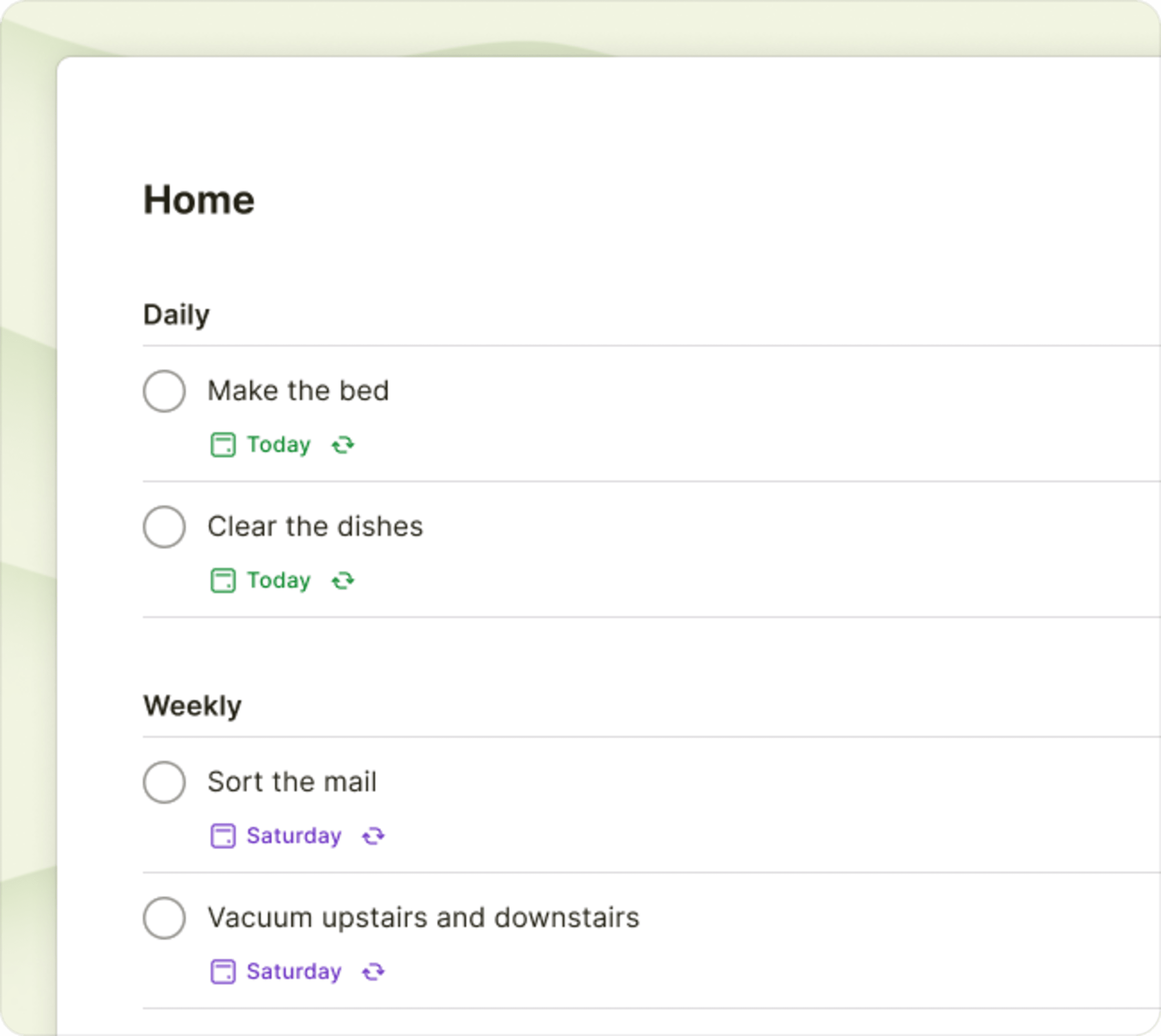
Declutter your home. It’s not hard for a home to get messy. A few used cups here, some unfolded laundry there, that outfit you haven’t worn in years but you might someday maybe need...all of a sudden, your house is in disarray. Regularly take time to purge items you don’t need and what doesn’t spark joy.
- Regularly check your pantry and fridge for old and expired items
- Donate clothing, toys, and books you no longer use.
- Empty your kitchen of old cooking tools, pots, and pans.
Automate and outsource errands and chores. We’re living in a convenience age and you should take advantage of it. Some help from technology and others can reduce the stress of maintaining a home.
- Try grocery delivery services instead of going shopping
- Hire someone for a monthly house cleaning, lawn mowing, or snow shoveling
- Hire someone for taxes and bookkeeping
Of course, outsourcing comes with a cost. If these aren’t within your budget, outsource tasks the good ol’ fashion way: delegating to roommates, partners, and kids. Get everyone in your household involved in its upkeep. Clarify responsibilities by formally assigning them.

Health and Fitness
Making time for a healthy lifestyle is a multiplier for everything else: we become better at our jobs, can be more present for our loved ones, and feel more motivated to tackle life’s other challenges. Unfortunately, it’s also often the first thing to fall to the wayside when the stress of everyday life takes over.
By doing our best each day instead of opting for all-or-nothing we can maintain balance when it comes to health and fitness.
Organize Your Health and Fitness
[Apply the lessons of Inclinations, Balance, Prioritize, and Measure.]
Follow your inclinations with diet and exercise. Instead of forcing yourself to adapt to the latest crazes in diet and exercise, do what feels right for you. There’s probably a handful of vegetables you like and some form of physical activity you find enjoyable. Personalize your meals and workouts so they don’t feel like torture.
- Instead of the gym, join a hiking group so you can exercise outdoors with others.
- Opt out of bland “diet foods” and find healthy variations of the foods you love.
- If you hate early morning workouts, do a little physical activity throughout the day in spurts.
Use balance when thinking about healthy food choices. This is an area where “good enough” is almost always more sustainable than “perfect”. For example, follow the 80/20 rule when it comes to eating – eat a healthy diet 80% of the time and indulge in some treats 20% of the time. The same applies for exercise, ensure you’re taking regular rest days so your body can recover.
Try meal planning so you'll always have healthy meals available
Prioritize health and fitness. In the vicious cycle of “too much to do”, we often drop time-consuming healthy habits when we’re feeling stressed about work and life. This only leads to more stress when we don’t have an outlet to channel our frustrations and healthy food to support our energy levels. Keep healthy habits like cooking or taking daily walks at the top of your priority list.
- Set aside a few hours during the weekend to meal prep for the rest of the week and ensure your fridge is stocked with healthy options.
- Block off your workouts on your calendar and treat them as real appointments with yourself.

Set and measure fitness goals. Fitness is often fun when it can be gamified. To stay motivated, record your workouts and track your fitness over time.
- Use apps like Strava to keep track of your runs
- Wear a fitness tracker to count your steps
- Record your lifts and keep track of our PRs (personal records)
Finances
Money can buy financial freedom and peace of mind. It can also buy a whole lot of things we don’t need. By organizing your finances with care, you can set yourself up for the future without depriving yourself in the present.
Organize Your Finances
[Apply the lessons of Planning, Consistency over perfection, Measure, Automate and Outsource.]
Plan your money flow. Get closely acquainted with managing your money through budgeting. Understand your net income and create a budget that includes fixed expenses, variable expenses, debts, and savings. Create a month by month budget that takes these into account.
- Make sure to include everything in your budget: child care, rent or mortgage, insurance, food, utilities, emergency fund, savings, donations, subscriptions, clothing, gifts, gym memberships, prescriptions, loan repayments, phone bills, and everything else you spend money on.
- Use budgeting tools like YNAB to streamline your finances.
- Regularly audit and assess your budget to ensure you’re sticking to it and adjusting as needed. This is another instance where “good enough” beats “perfect” in the long-run.
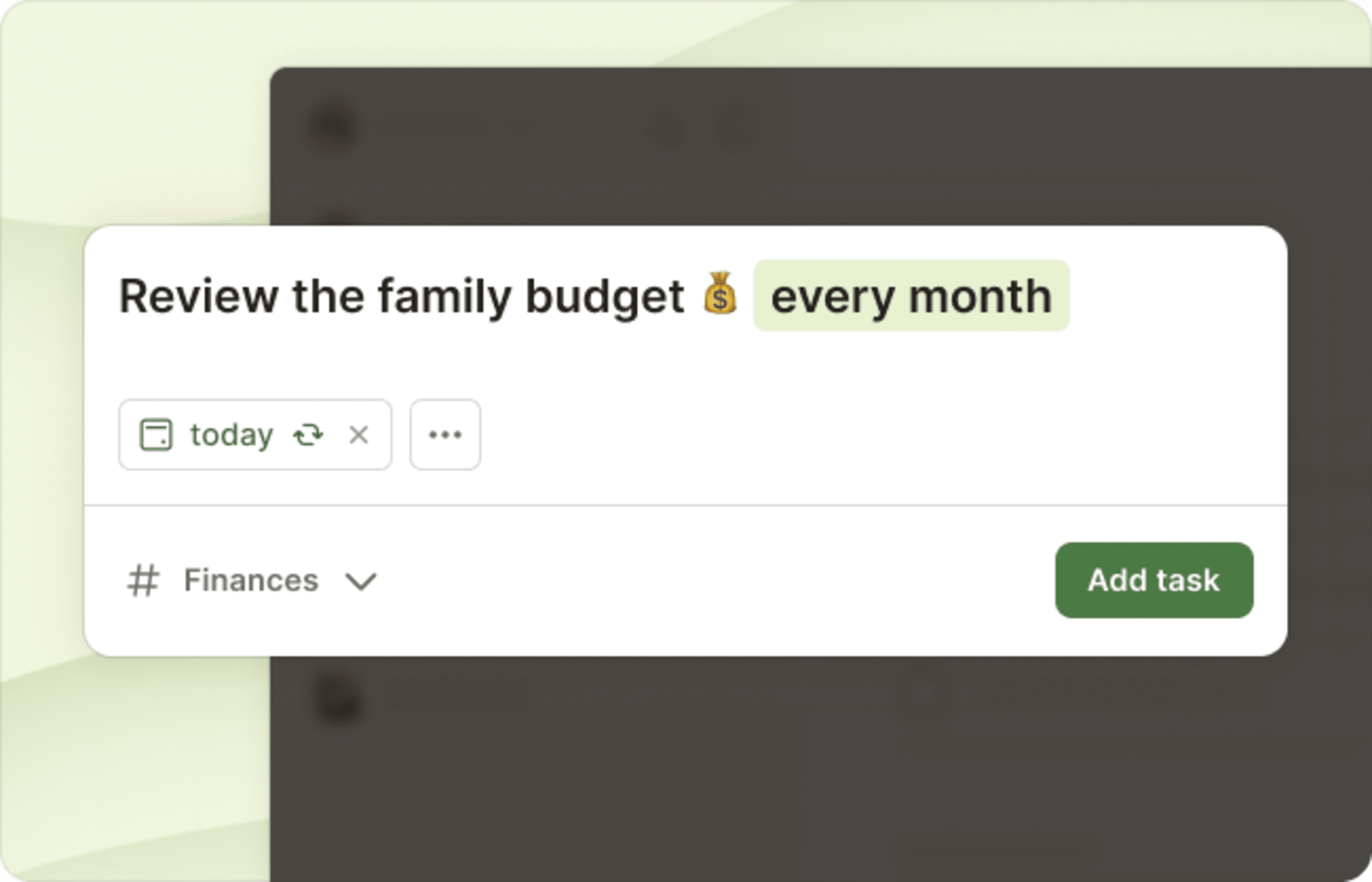
Be consistent when it comes to savings. Compounding interest will help grow your savings and put you on the right path for funding life’s biggest purchases or saving for retirement. By consistently saving a portion of your salary each month, even if it doesn’t feel significant, you can grow your net worth over time.
- Try a Compound Interest Calculator to see just how small monthly payments towards savings can add up over 5, 10, 20, or 40 years.
- Add to your savings every single month. While allocating a percentage of your salary is best (e.g. 20%), even small amounts will make an impact over time.
Measure your finances. Set financial goals for different time periods: 1 month, 12 months, 5 years, 10 years, etc. Consistently measure your progress towards them and adjust accordingly based on whether you’re meeting your targets.
- Use the Objectives and Key Results (OKR) method to set financial goals like “Save $5000 per year” or “Reduce spending on food and entertainment by 10%”.
Automate your finances. Decrease the amount of time you spend on everything from paying bills to budgeting by introducing automation to your life.
- Set up automatic transfers from your checking account to your savings and investments account each month.
- Set up automatic bill payments for expenses like your phone bill, internet bill, cable bill and more. This will help you avoid any late payments and remove the hassle of manual payments.
Relationships
Relationships with friends and family are the single most important thing we can cultivate in life. When interviewing 90-somethings, Lydia Soh’s discovered this in her conversations:
“Their joys and regrets have nothing to do with their careers, but with their parents, children, spouses, and friends.”
She found that people wished they had “loved more” not “accomplished more”. By acting on this advice while we have the time, we can live more fulfilling lives and minimize regrets later in life.
Organize Your Social Life
[Apply the lessons of Planning and Consistency over perfection.]
Make time for planning social outings. The older and busier we become, the less time there seems to be for spontaneous date nights and random coffee dates with friends. Proactively plan time with all the people in your life you care about, rather than waiting for plans to assemble themselves.
- Take charge of organizing dinners with friends and taking the work out of socializing for others. Taking care of the details goes a long way.
- Put date nights on the calendar with your significant other.
- Subscribe to local newsletters and blogs that share inexpensive and kid-friendly events in your city for family outings.
- Take “getting something on the calendar” literally and send your friends Google calendar invites
- When with friends, set a date and time for your next get together before people leave
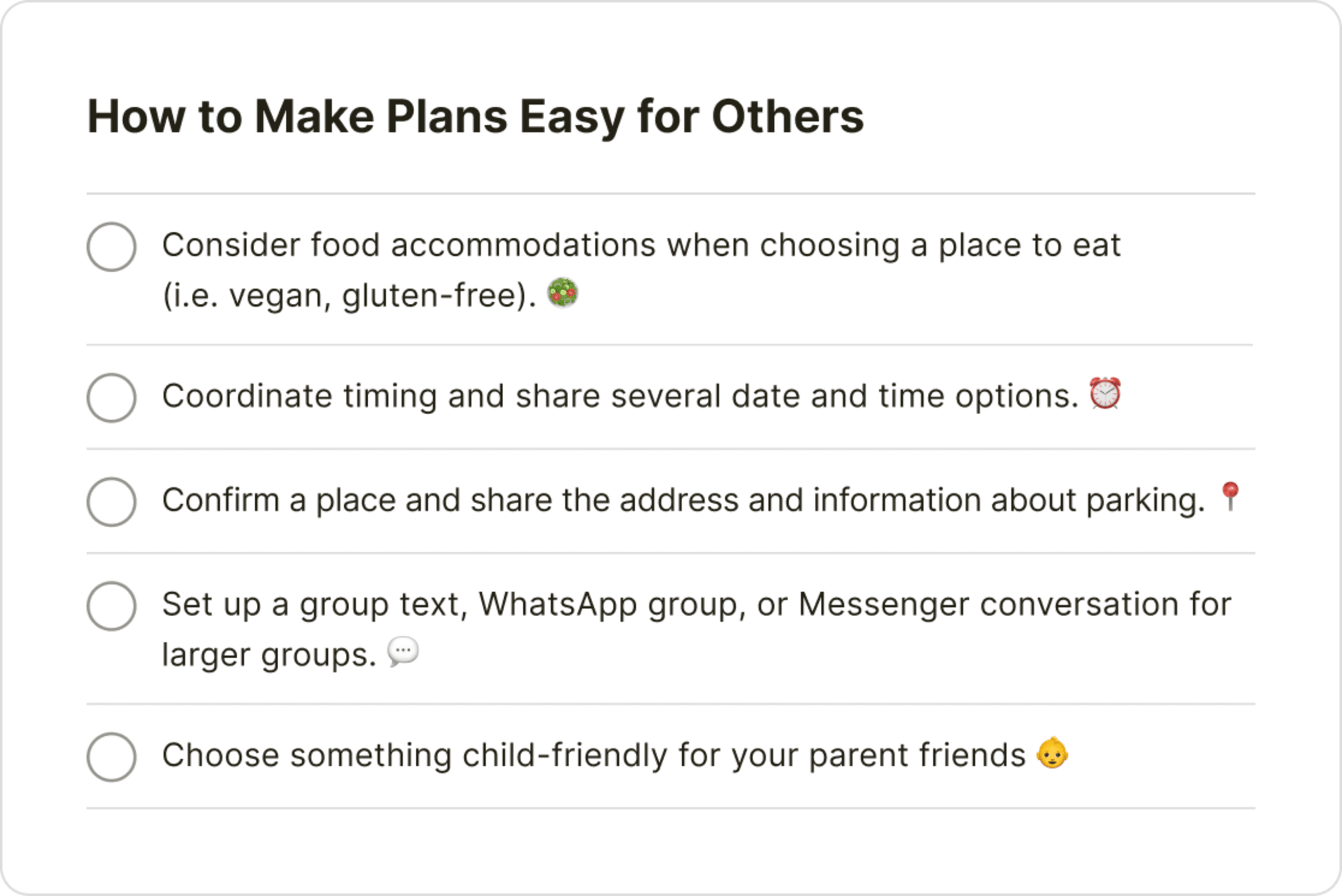
Practice consistency with seeing friends and family. How many times does seeing a loved one start of with this phrase: “It’s been too long”? Minimize the year-long stretches between seeing friends and family by opting for consistency as much as possible.
- Redefine what socializing looks like. Rather than long sit down brunches or dinners, try everyday things to see more of your friends and family: runnings errands together, joint workouts, cooking meals, at-home TV and movie nights, or helping them with household tasks (furniture assembly, painting a room, moving).
- For long-distance relationships, make use of phone calls and video chat to decrease the time between seeing one another. These can be a nice digital substitute for face-to-face get togethers. However, passive interactions on social networks like Facebook and Instagram don't provide the same level of connection.
Travel
Exploring new places can add variety to life and teach you about new cultures. But, between boarding passes and connecting flights, it can also be stressful and expensive. Organizing exploration can add peace of mind whether you’re discovering the canals of Amsterdam or attractions in your own city.
Organize Your Travel
[Apply the lessons of Planning and Experimenting.]
Take the stress out of travel with planning. Heading to an airport with a backpack and buying a ticket for whatever flight is leaving next is perfect for rom-com characters. For the rest of us, careful planning helps us avoid expired passports and forgotten contact solution. It also helps with showing up to a new destination and knowing the right spots instead of being sucked into tourist traps.
- Create a travel checklist with everything you need to pack. Keep it light and avoid aspirational packing – you probably don’t need 4 workout outfits and 5 books. In fact, try travel minimalism and consider bringing only a single carry-on and personal item (of course, this is more challenging with kids). When creating your list, run through everything you need for a day and capture all the travel specific things you need too: passports, health insurance, sleeping pillow, etc.
- While much of the fun of travel is the spontaneity, make sure to plan some visits to great local destinations. Use YouTube, travel blogs, Instagram, and Google Reviews to find top rated parks, restaurants, and attractions wherever you’re going. Depending on the length of your trip, have a list of 4-5 must-sees.
Experiment with new travel spots. While repeats can be nice, try choosing travel destinations you’ve never been before. Rather than repeating an annual family trip to the same place, exploring a different corner of the earth can add excitement to your usual routine.
- Ask your friends, family, and colleagues for their favorite vacation destinations. People are often eager to discuss their travels and can provide a first-hand account of what to do and everything you should skip.
- Save money and make “travel” a weekly or monthly habit by being a Tourist in your own city. Very few of us take advantage of everything our own locations have to offer. Look up newly opened restaurants and explore different parts of the city you’re not familiar with.
Deciding how to organize your life isn’t about precisely what time you should wake-up in the morning or exactly where you should store your important documents. Rather than getting caught up in these details, pay attention to the bigger principles of leading a good life.
By learning the Organize Your Life framework, you can apply it to every area of your life that matters: home, work, relationships and everything in between. You can stop juggling balls and move onto the next act.

